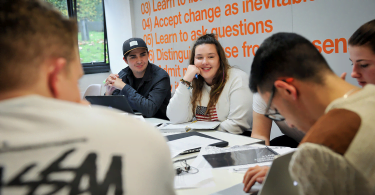Finding time to catch up on the news can seem difficult. In between studying and/or working, socialising, eating and sleeping, it can feel like there’s little time left to sit down and get the latest on the biggest news stories of the day.
For journalists, it’s part of the job to stay on top of the news. This isn’t just the case for news reporters and columnists – to take a recent example, fashion journalists would need to know the background to Carrie Symonds, Boris Johnson’s girlfriend, wearing a sustainable, eco-friendly dress at her first public appearance since Johnson became Prime Minister. They would need to know that the environment is an issue close to Ms Symonds’ heart, and it would be useful to know what Johnson’s views on the environment are and what his Government’s policies are regarding trophy hunting and tackling climate change – two things Ms Symonds regularly speaks out about. Writing a story about her dress without this background information means the story loses most of its significance.
In Ofcom’s annual report on news consumption in the UK, they found that TV remains the most popular way to consume news. While this might be surprising, especially to young people who Ofcom say watch an average of just two minutes of TV news per day, the number of people consuming news this way has been decreasing in recent years. With more people turning to streaming sites such as Netflix or Amazon Prime, or choosing to watch TV programmes on catch-up services, fewer people are watching live broadcast in the evenings, which are often followed by the news which is then watched by default. Unsurprisingly, the use of social media to consume news has increased in the same period that TV news viewing has decreased, with Facebook being one of the top three outlets adults use to consume news.
The danger of using social media to find out and follow news stories is the prevalence of fake news sites and unchecked stories and sources. Coupled with social media algorithms that show you more of what you regularly engage with, this can reduce your access to a range of reliable news stories. Even a story tweeted by the BBC News account can garner thousands of replies accusing it of biased reporting, which can influence whether the consumer views the BBC as a source of accurate news. It might be easier to consume news as part of your social media fix, but, especially where commentary and opinion journalism are concerned, this method might not be the most informative or reliable.
Being politically aware is more than just knowing what’s in the news. It’s about understanding the implications of policies and sensing how the hidden agendas of government, businesses and other bodies might be influencing their actions. For journalists, political awareness is essential because they are often on the front line of informing the wider public about policies and events that will affect them. If journalists aren’t politically aware and can’t link a news story to the wider political environment influencing it, how are the rest of the public meant to understand? Granted, if you work in an industry that also depends on a high level of political awareness, such as the civil service or business, then political awareness comes with the job. But for many people who don’t have to rely on the news to do or understand their job, journalists play an essential role.
Political awareness is vital to any profession because politics seeps into all aspects of everyday life. If you’re a teacher, you need to be aware of what cuts your council are implementing and how they could affect your school and the children who attend. If you work in marketing, you need to know about current trends and issues the government are being lobbied on. If you work in retail, you need to know why stores around you are closing and less people are shopping on the high street, the politics behind the liquidation of companies and what impact this could have on your employment. It benefits everyone to be politically aware, but with an increase in fake news and partisan news outlets, it’s never been more important to source your news carefully and critically. It follows therefore, that journalists have am increasingly vital role to play.
Increasing your political awareness can feel like quite a daunting task, but it doesn’t need to be. Here’s a few tips to get started:
Social media
Start by curating your social media feeds so you follow a couple of reliable news sites. Incorporating these accounts into your news feed means throughout the day you’ll see the key things being talked about.
Apps
Download some news apps onto your phone and allow them to send you push notifications. During the day, take the time to read a couple of articles or watch the evening news.
Podcasts
There are loads of news and current affairs podcasts which dissect some of the biggest news stories on a weekly basis. Putting one of these on while you’re in the shower or commuting is a great – and easy – way to stay informed.










